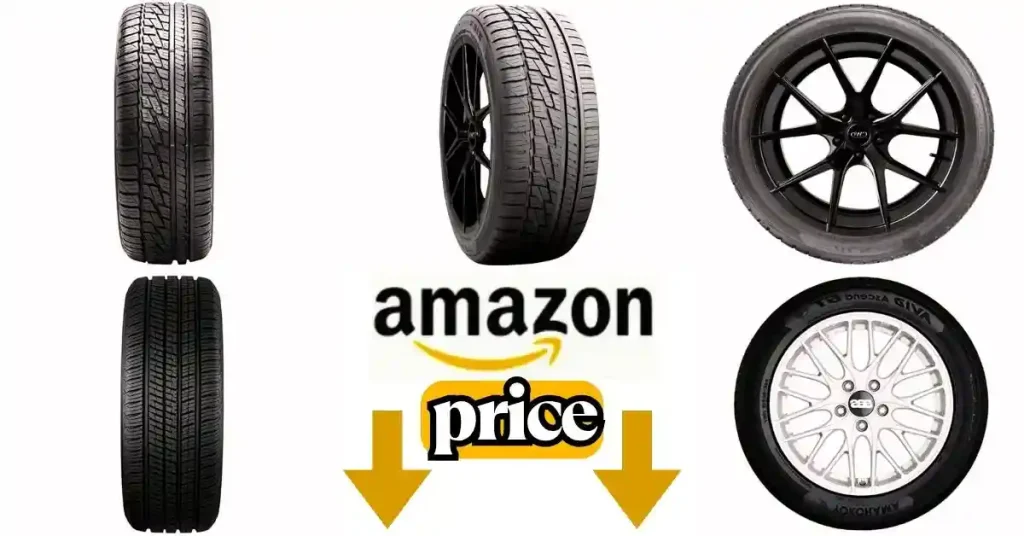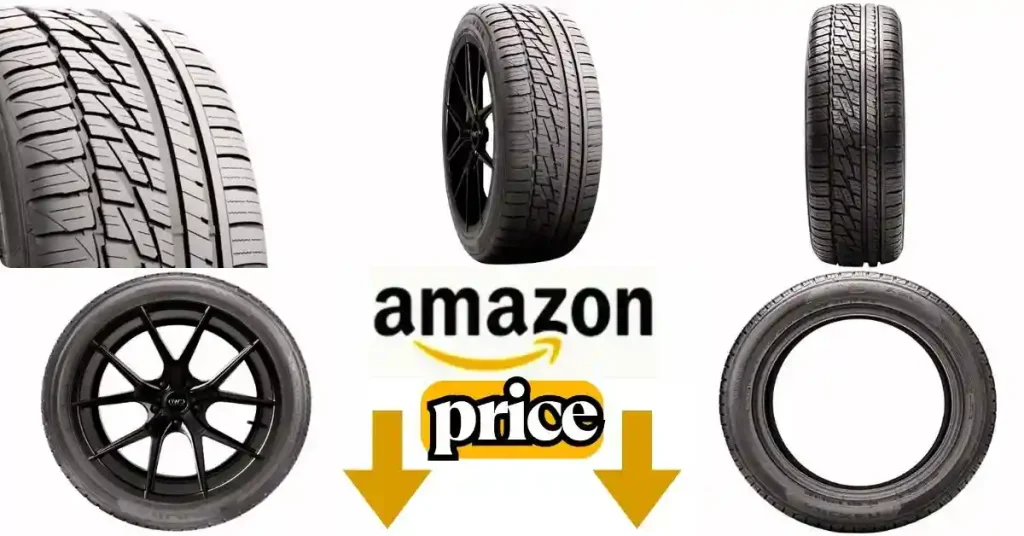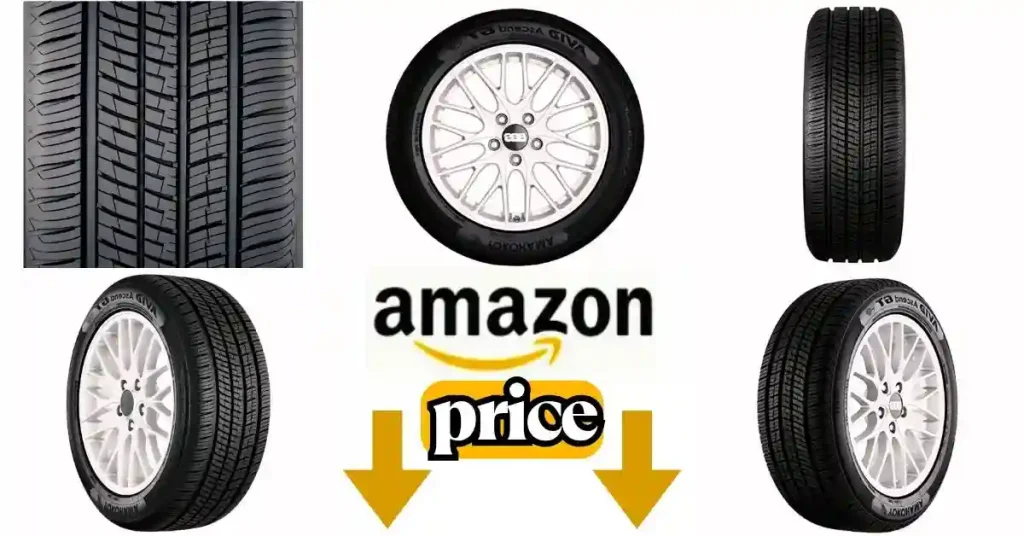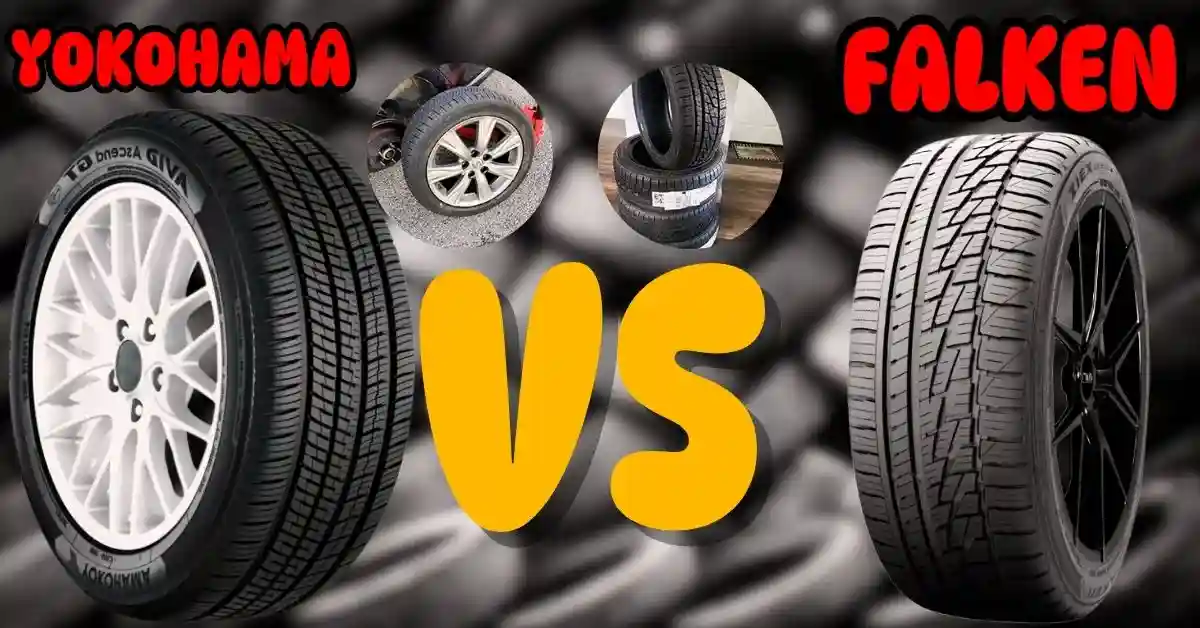Falken vs Yokohama—I’ve driven on both, and the difference surprised me. One gave me grip in the rain. The other made my long drives smooth and quiet. I’ve tested them on dirt roads, highways, and in city traffic. In this guide, I’ll share what I’ve learned. If you’re torn between Falken tires and Yokohama tires, I’ll help you pick the one that fits your needs.
Quick Verdict – Falken vs Yokohama at a Glance
If you need a fast answer, here it is. I’ve tested both tires in daily use. Here’s how they compare:
- Performance
Both grip well. But Yokohama handles better in rain. Falken is steady and safe in dry weather.
→ Pick Yokohama if you want sharp turns and great wet grip. - Price
Falken costs less. You get strong performance without a big bill. Yokohama feels more high-end—and it shows in the price.
→ Falken is great if you want to save money. - Tread Life
In my experience, Falken lasts a bit longer. Yokohama varies by model. Some wear out fast due to soft rubber.
→ Falken is better if long life matters to you. - Eco Features
Yokohama leads in green tech. Their BluEarth line helps save fuel. Falken has not gone as far in this area.
→ Yokohama is the pick for eco-aware drivers. - Best For
- Falken: Great for budget shoppers, daily drivers, and folks who hit light trails.
- Yokohama: Best for rainy areas, fuel savers, and people who want a smooth, high-end feel.
- Falken: Great for budget shoppers, daily drivers, and folks who hit light trails.
Bottom line:
If you want top grip and fuel savings, go with Yokohama. If you want strong value and longer tread life, Falken is a smart choice.

👉🏿👉🏻 Check Latest Price and Offer at Amazon 👈🏻👈🏿
👉🏿👉🏻 Check Latest Price and Offer at Amazon 👈🏻👈🏿
Meet the Brands: Falken and Yokohama in Plain Terms
Who Makes Falken Tires?
Falken Tires are made by Sumitomo Rubber Industries, one of the top tire makers in Japan. They’ve been around for decades and are known for making tough, high-grip tires. If you’ve seen their name in racing or off-road forums, that’s because they’ve earned it.
Falken focuses on performance and all-terrain tires. I first tried a set of Wildpeaks on a friend’s truck during a muddy trail ride. They held up great and felt super solid, even in the rain. For the price, they do more than you’d expect. Many Falken models give you a strong mix of grip, comfort, and tread life.
Falken tires are a solid pick if you want a good-performing tire without spending too much. They’re built with Japanese know-how and made for real-world roads.
What’s the Story Behind Yokohama Tires?
Yokohama started back in 1917, and they’ve been making smart, reliable tires ever since. What sets them apart is how they blend old-school quality with new tech. Their BluEarth line saves fuel, and the ADVAN series is made for high-speed grip and control.
I once swapped my daily commuter tires for a set of BluEarths. The gas mileage went up almost right away, and they felt smooth on the road. That kind of change sticks with you. Yokohama also has a big presence in the U.S., which makes service and support easy to find.
Yokohama tires are great if you want eco-friendly options and proven tech. They cost a bit more, but you get solid value with long-term savings and great performance.
My Hands-On Experience with Falken Tires
Where Falken Tires Shine
Falken tires grip well. I noticed it right away—on dry roads and in heavy rain. They felt steady and sure, even when I had to brake fast. That kind of grip makes a big difference in everyday driving.
The ride was also smooth. Around town, the tires stayed quiet. They handled bumps well and made my car feel calm. For the price, the comfort was better than I expected.
I was also happy with the tread life. I got over 40,000 miles before they started to wear down. For a mid-range tire, that’s a win. It’s good value if you’re watching your budget.
Where Falken Falls Short
There were a few downsides. At highway speeds, the tires got louder. On rough roads, the noise was clear. It didn’t ruin the drive, but it was hard to ignore.
Fuel use also went up a bit. Falken tires don’t save gas like some eco tires do. My MPG dropped after I switched, which mattered on long drives.
Still, if you want grip, comfort, and solid tread life, Falken is worth it. They’re a smart pick for daily use, especially if you’re not chasing top fuel savings.

👉🏿👉🏻 Check Latest Price and Offer at Amazon 👈🏻👈🏿
My Real-World Take on Yokohama Tires
Why I Respect Yokohama’s Innovation
Yokohama tires are smart. They help you save gas and grip the road well. I first used their BluEarth line. It gave me better mileage right away. That means fewer stops for gas and more money in your pocket.
Their ADVAN tires are made for people who love to drive. I took them on some sharp turns, and they held tight. The steering felt quick. Braking was strong and smooth. Even in the rain, I felt safe.
For me, these tires give peace of mind. They’re made for real roads and real weather. If you want both fun and safety, Yokohama delivers.
Where Yokohama Could Improve
Let’s talk price. Yokohama tires are not cheap. You can find lower-cost options out there. But with those, you often lose grip or ride comfort.
Also, tread life can change by model. One set lasted me over 50,000 miles. Another wore out closer to 35,000. That’s a big range. So make sure you check reviews before you buy.
Still, I think the value is there. You get fuel savings, strong grip, and a quiet ride. If you want a tire that works hard and lasts, Yokohama is worth a look.

👉🏿👉🏻 Check Latest Price and Offer at Amazon 👈🏻👈🏿
Falken vs Yokohama – Side-by-Side Comparison
Performance
On dry roads, both tires work well. But Yokohama grips better in turns. I felt more in control while cornering. Falken did okay, but it wasn’t as sharp.
In the rain, Yokohama stops faster and slides less. I drove both in wet weather and felt safer on Yokohama.
For daily drives, Falken is fine. But if you want sporty feel, Yokohama is better for grip and speed.
Durability and Longevity
In my use, Falken tires lasted longer. My set got close to 60,000 miles with good care. That’s strong for the price.
Yokohama’s wear rate changes by model. Their fast tires wear out quicker. But that’s normal for high-speed designs.
If long life matters, Falken gives you more miles per dollar. Yokohama trades some life for better tech.
Comfort and Noise
Yokohama rides smoother and stays quiet. On the highway, I heard less noise. It felt soft even on bumpy roads.
Falken tires are louder, mostly at high speeds. It’s not bad, but you’ll hear a bit more hum.
If you want a quiet ride, Yokohama is the better pick. But if you drive rough roads, Falken holds up well.
Fuel Efficiency and Eco Impact
Yokohama uses smart tech to save gas. Their BluEarth tires roll easy and burn less fuel. I saw a small boost in MPG after I made the switch.
Falken doesn’t focus much on fuel savings. Their rubber grips more but may cost a bit more in gas.
For fuel use, Yokohama wins with eco-friendly tires. If that matters to you, they’re worth it.
Price and Value
Falken gives great value for the cost. They’re cheaper but still give good grip and long wear. I’ve used them and felt like I got a deal.
Yokohama costs more. But you get tech, fuel savings, and a smooth ride. It feels like a premium tire.
If you’re on a tight budget, Falken is a smart pick. If you want top comfort and tech, go with Yokohama.
Are Falken Tires Good Quality? My Verdict
Yes, Falken tires are good. They offer great grip. They work well in both dry and wet weather. I’ve driven on them for years and had no major issues.
They also last longer than I first thought. My Falken Wildpeak tires gave me over 40,000 miles. That’s a solid deal for the price.
Falken tires feel stable on the road. They don’t slip in the rain. They handle corners well. They stop fast when needed. That gave me peace of mind.
They ride smooth in the city. On the highway, they can get a bit loud. But not enough to be a big deal. I still found them comfy for long trips.
Here are my top picks:
- Falken Wildpeak A/T3W – Best for off-road and snow.
- Falken Ziex ZE950 – Great all-around tire for small cars.
- Falken Pro G5 CSV – Nice choice for SUVs and daily drives.
In short, Falken tires are a smart buy. They are strong, safe, and easy on your wallet.
Are Yokohama Tires the Best? Here’s My Honest Take
Are Yokohama tires the best? That depends on what you want. But in my view, they’re one of the top picks—especially if you care about comfort, safety, and saving gas.
Where They Excel
Let’s start with what they do well. Yokohama tires give you a smooth, quiet ride. Even on long drives, they feel soft and stable. I first tried the BluEarth line on my old sedan. I was shocked at how quiet the cabin got—and I even saved a bit on gas.
They also grip well in the rain. I’ve tested them in heavy storms and never felt the car slip. That’s big for peace of mind. And if you like sporty driving, the ADVAN tires are sharp. They grip in corners and stop fast. You can feel the track tech in them.
Who They’re Best For
If you drive every day and want peace of mind, Yokohama is a great choice. These tires are good for:
- Daily commuters
- Eco-friendly drivers
- Rainy or mixed weather
- People who want a quiet ride
They do cost more than some brands. But you get smart design, better grip, and smoother rides. They’re worth it if you want more than just “okay” tires.
I’ve driven with mid-range tires before. Trust me—Yokohama feels more refined. Less noise, better feel, and fewer worries.
Yokohama Models Worth a Look
Here are some of my top picks:
- AVID Ascend GT – All-season, smooth ride, strong in rain
- BluEarth S34 – Great if you want to save on gas
- ADVAN Sport V105 – Sporty, fast, and fun to drive
- iceGUARD iG53 – My go-to for snow and ice
In short: Yokohama makes tires that feel safe, smooth, and smart. You pay a bit more, but the ride says it all.
Common Questions Answered (Voice Search-Optimized FAQ)
Is Falken made by Yokohama?
No. Falken is not made by Yokohama. It’s made by a different company called Sumitomo Rubber Industries. Both are from Japan, but they are not linked.
Are Falken tires good quality?
Yes, they are. Falken tires are strong, safe, and last long. I’ve driven on them for years. They grip well and don’t wear out fast. Great for the price.
Are Yokohama tires the best?
They might be. Yokohama makes great tires with new tech. They ride smooth, save gas, and work well in rain. They cost more, but you get what you pay for.
Which lasts longer—Falken or Yokohama?
It depends. Falken may last a bit longer in some models. But Yokohama is better for gas use. I’ve used both. They each have strong points.
What’s better for winter—Falken or Yokohama?
Yokohama wins here. Their iceGUARD tires are great in snow and ice. Falken is fine for light winter. But for deep snow, I’d trust Yokohama more.
Final Thoughts: Which Tire Should You Choose?
Both Falken and Yokohama make great tires. I’ve driven with both. Here’s what I found.
Need to save cash? Go with Falken. You get good grip, long life, and fair price. It’s great for daily use.
Want more miles per gallon? Pick Yokohama. Its eco tires help you save gas. They also grip well in rain and snow.
Like to drive fast? Try Yokohama’s ADVAN line. It hugs sharp turns. But Falken’s Azenis tires are fun too—and cost less.
Here’s what I’d say by type of driver:
- Daily rides: Falken is smooth and quiet.
- Long trips: Yokohama is better for gas and comfort.
- Off-road fun: Falken’s Wildpeak line handles rough roads well.
- Speed lovers: Yokohama’s ADVAN gives sharp control.
To sum it up:
👉 Falken is top for price and all-around use.
👉 Yokohama wins for tech and green perks.
Pick what fits your roads and needs. Tires are not “one size fits all.” What works for city streets might not be best for dirt or snow. But if you’re choosing between these two? You’re already in good hands.
My Pro Tips for Choosing Between Falken and Yokohama
If you’re stuck between Falken and Yokohama, I’ve been there. Both brands have strengths. But your best pick depends on your roads, your weather, and how you drive.
First, think about your weather. Do you get lots of rain or snow? If so, go with Yokohama. Their wet grip and snow-ready models (like iceGUARD) really hold the road. If your roads stay dry most of the year, Falken’s high-performance tires will likely do the job—and cost you less.
Next, look at the roads you drive. If you hit dirt trails or rough paths, Falken’s Wildpeak tires are built for that. They grip well, even on loose ground. But if you stick to smooth highways, Yokohama gives a quieter ride and better gas mileage—especially with their eco line, BluEarth.
Check your mileage, too. If you rack up the miles each year, you want a tire that lasts. Falken often gives you more tread for the price, while Yokohama offers fuel savings that may even out the cost in the long run. From my own use, Falken tires lasted longer than I expected, even with daily driving.
Don’t skip the fine print. The warranty tells you a lot. Some Yokohama tires come with solid coverage, while others vary. Falken’s are more consistent. Always check what’s covered, and how long.
And here’s a big one: Don’t just buy for the brand. One Falken model might be perfect for snow, while another is better for street speed. Same with Yokohama. Match the tire to your needs, not just the name on the sidewall.
👉 Quick tip: Use online tire tools to match models to your car and habits. I’ve avoided a few mistakes that way.
In the end, tires are like shoes—you need the right pair for the road ahead. I’ve driven on both brands through rain, snow, dirt, and freeway heat. With a little care and the right match, you’ll be happy with either.
To Get More About Car Accessories Product You Can Visit Our Site. If You Found our Posts Helpful Leave a Comment Below

